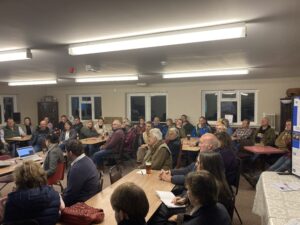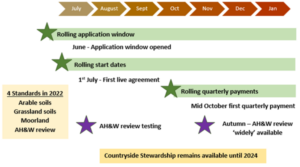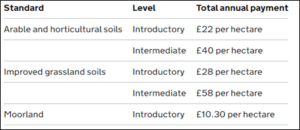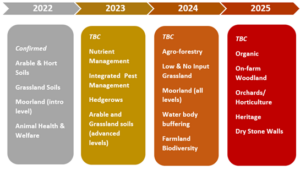The Wight Rural Hub team have been busy since our opening on 1st November with our initial priority to set up lines of communication to and raise awareness with  Island rural and farming stakeholders and promote what we will be offering to Island farmers and land managers. We will be collaborating with these stakeholders going forward, some of whom are represented on our Steering Group, to raise awareness of opportunities, training and events to benefit Island farmers and land managers and their businesses.
Island rural and farming stakeholders and promote what we will be offering to Island farmers and land managers. We will be collaborating with these stakeholders going forward, some of whom are represented on our Steering Group, to raise awareness of opportunities, training and events to benefit Island farmers and land managers and their businesses.
With so many updates following the recent political upheaval we felt it important to start our farmer and land manager engagement an Agricultural Transition update meeting. Attendees were given an update on the progress of Defra’s Agricultural Transition plans by NFU senior advisor Richard Wordsworth, who joined us virtually and gave us a run through of progress on ELMs and the other new schemes and grants on offer currently.
During his presentation Richard highlighted some of the following areas that should be given consideration in the coming months;
- Continued Reductions to Direct Payments / Basic Payment Scheme (BPS) : BPS, which as of 2022 is now made in two payment instalments in July and December, has been subject to progressive reductions to payments since 2021, which will continue until it is withdrawn in 2027. To calculate how this impacts your BPS payment the Rural Payments Agency offer a reductions calculator which can be found here. For example, on a claim that is worth £40,000, in 2022 a 20% reduction is applied to the first £30,000 and a 25% reduction is applied to the next £10,000 resulting in a revised payment of £31,500 being made for 2022.

- Delinked Payments : From 2024 to 2027 BPS claim payments will be replaced with delinked payments, the payment of direct payments without a claim or a requirement to hold entitlements or land but rather a payment based on a defined historic reference period. Eligible BPS claimants will be automatically transferred to the delinking process to receive payments. It is necessary to have claimed and be eligible for BPS in 2023 to be able to receive delinked payments in 2024 to 2027. You will need to claim and be eligible for BPS in 2023 in order to receive Delinked Payments. The value of the delinked payment amount will be based on the average of payments received for BPS in 2020, 2021 and 2022 (reference period). Receiving a delinked payment will not disqualify the recipient from applying for payment under new schemes, including the environmental land management schemes. To calculate a Delinked Payment Reference amount, add up adjusted eligible BPS / Greening / Young Farmer Scheme claim values for the years 2020 to 2022 and divide by 3 = an average reference amount. A progressive reduction will continue to be made to this amount until the removal of payments in 2027. Changes to your business and BPS claims in the period 2020 to 2023 could affect your eligibility for and the amount due under delinked payments and should be carefully considered to avoid a “cliff fall” in payments received. We will be providing more information on this ahead of the 2023 BPS claim window.
- Existing Agri-environment Payments & Applications : For existing Countryside Stewardship (CS) and Environmental Stewardship (ES) schemes the annual claim window will be mid-March to 15 May. The CS application window for new agreements for a 1 January 2024 is expected to open in February 2023 and will be the last year for applications to the existing CS scheme. CS Capital grants now have a rolling application window. Existing CS / ELS Agreements are moving from EU to domestic regulation from 1 January 2023, and for those coming to their scheme end in 2023 an offer, subject to inspection, will likely be made to mirror or extend the existing agreement, under the domestic regulation. Benefits include reduced retrospective penalty risk. HLS extensions will be for up to 5 years (previously only 1 year) and agreement holders will be able to leave an agreement early to enter the new schemes as they become available.
- Sustainable Farming Incentive (SFI) – 2022 Standards : SFI is the first part of ELMs to be made available to BPS claimants and launched with an initial 3 standards in 2022; Arable and horticultural soils, Improved grassland soils and Moorland. Applicants can decide how much of the eligible land on their holding to commit to the 3 year scheme, and at what level under each standard. Further standards are going to be available each year in 2023 and 2024, and can be added to build the agreement, with the scheme to be fully in place in 2025. Agreements start on 1st of every month and payments will be made quarterly, e.g., if an agreement starts on 1 September the first payment will be at least three months later e.g., mid-December. Full scheme details can be found here.



- Farming in Protected Landscapes (FiPL) : FiPL is a programme of grant funding for one-off capital projects between 2021 and 2024, delivering against four themes; Nature, Climate, People, Place, in National Parks and AONBs, including the Isle of Wight AONB. It will support farmers and land managers to conduct projects that; support nature recovery, mitigate climate change impacts, provide opportunities for people to discover, enjoy and understand the landscape and its cultural heritage, and support nature-friendly, sustainable farm businesses in these places. The application window is expected to close by March 2024. Nationally FiPL is £52million of funding, spread over three years and split across 44 designated landscapes. For further information see the IW AONB here
Things to look out for in 2023;
- Farming Transformation Fund – Water Management Grant
- Farming Transformation Fund – Improving Farm Productivity
- Animal Health & Welfare Pathway : Another government fund to look out for is a paid annual vet visit, which will help cover agreeing achievable actions with an advising vet / vet led team with 2-3 hours looking at health/welfare improvements followed by a written report with recommendations, and diagnostic testing e.g., BVD in cattle. The data collected will be used to understand national herd/flock health and will not be used during inspections/enforcement. The payment for each species is different because required testing for some species may take longer to do and some results cost more to analyse. Flat rate annual payment per review and the following rates; pigs £684; Sheep £436; beef cattle £522; Dairy cattle £372. This is available to farmers eligible for BPS who keep more than 50 pigs, 20 sheep or 10 cattle.
Richard advised that the NFU were actively involved in discussions with Defra around the future of farm schemes and support, and that an update on any changes to the roll out of the new schemes is expected in early 2023.
We will be providing further update meetings in 2023 and to keep up to date with the latest developments we recommend you subscribe to the Defra Blog here
